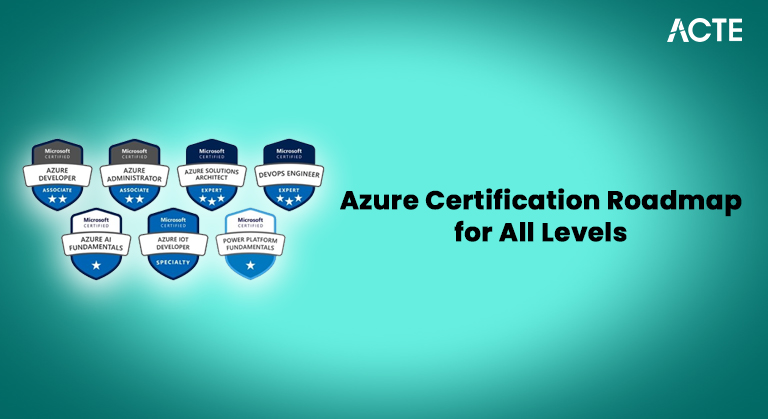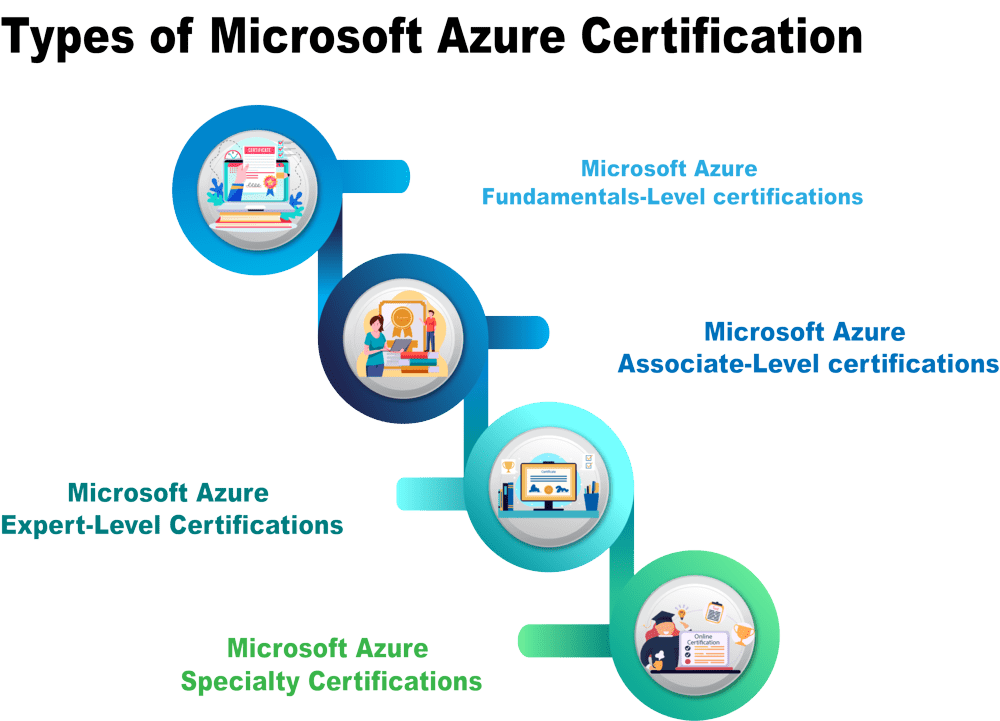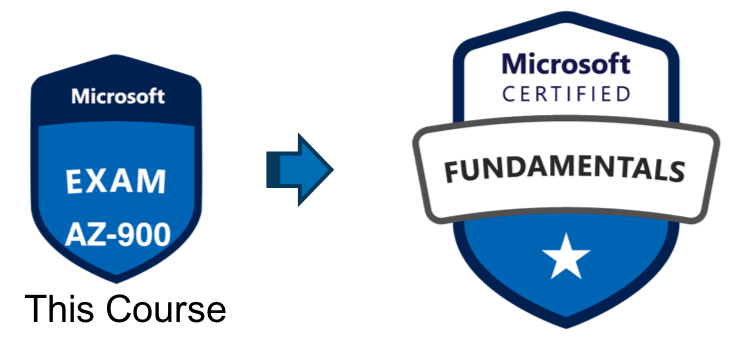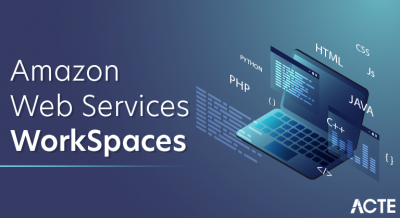
- Introduction to Azure Certifications
- Why Pursue Azure Certifications?
- Types of Azure Certifications
- Azure Certification Levels
- Key Azure Certifications to Consider
- Exam Preparation Tips for Azure Certifications
- Recommended Resources for Azure Certification Preparation
- Cost and Exam Details
- Azure Certification Benefits
- Conclusion
Introduction to Azure Certifications
Microsoft Azure is a leading cloud platform that offers a wide range of services, including compute, storage, networking, databases, analytics, and AI. As cloud adoption continues to grow, so does the demand for professionals skilled in Azure technologies. Azure certifications validate your ability to manage, implement, and maintain cloud solutions using Microsoft Azure. Whether you’re new to cloud computing or looking to advance your expertise, these certifications can help you stand out in a competitive job market. This roadmap outlines the different Microsoft Azure Training and certification levels—Fundamentals, Associate, Expert, and Specialty—and will help you choose the right path based on your skills, experience, and career goals. By earning Azure certifications, you not only gain industry-recognized credentials but also develop practical, job-ready skills that are directly applicable in real-world scenarios. They are an excellent way to demonstrate your commitment to continuous learning and cloud excellence.
Ready to Pursue Your Microsoft Azure Certificate? View The Microsoft Azure Course Offered By ACTE Right Now!
Why Pursue Azure Certifications?
- Industry Recognition: Microsoft Azure is one of the most widely used cloud platforms in enterprises, and having a certification demonstrates your ability to work with this powerful platform.
- Career Growth: With Azure certifications, you can pursue new job opportunities in cloud computing roles such as Azure Developer, Azure Administrator, Azure Solution Architect , and Azure DevOps Engineer.
- Increased Earning Potential: Certified professionals are generally in high demand, and due to their specialized expertise, they tend to earn higher salaries.
- Hands-on Experience: Azure certification exams typically require practical knowledge and hands-on experience, ensuring certified professionals are skilled in real-world scenarios.
- Global Recognition: Azure certifications are recognized worldwide, enabling professionals to expand their career opportunities beyond their local region.

Types of Azure Certifications
Azure certifications are offered in various areas of specialization, and Microsoft has designed a structured certification path that reflects increasing levels of expertise. Here’s a breakdown of the main categories of Azure certifications:
- Fundamental Certifications: These are beginner-level certifications for those new to Azure or cloud computing. They provide a foundational understanding of Azure and cloud concepts.
- Associate Certifications: Associate-level certifications are for professionals with hands-on experience in Azure. They focus on specific roles such as Azure Administrator Certification ,development, and Azure security.
- Expert Certifications: These certifications are intended for professionals with extensive experience in Azure. They focus on complex, high-level solutions and system architecture.
- Specialty Certifications: These are role-specific certifications that focus on niche areas within Azure, such as AI, IoT, and DevOps.
Azure Certification Levels
The Azure certification path is structured into four key levels: Fundamental, Associate, Expert, and Specialty, catering to different skill levels and professional expertise. Fundamental-level certifications are designed for beginners new to Azure or cloud computing. They cover basic concepts and introductory skills. Examples include Azure Fundamentals (AZ-900), Azure AI Fundamentals (AI-900), and Azure Data Fundamentals (DP-900). Associate-level certifications are meant for professionals with hands-on Azure experience who require knowledge of Azure services, administration, and development. Key certifications include Azure Administrator Associate (AZ-104), Azure Developer Associate (AZ-204), and Azure Security Engineer Associate (AZ-500). Expert-level certifications target advanced professionals with in-depth experience designing and managing Azure solutions. They require high technical expertise and focus on solution architecture and DevOps practices. Notable certifications include Azure Solutions Architect Expert (AZ-303 & AZ-304) and Azure DevOps Engineer Expert (AZ-400). Specialty-level certifications are specialized credentials for professionals focusing on specific Azure domains, such as AI, machine learning, or IoT. Examples include Azure AI Engineer Associate (AI-102) and Azure IoT Developer Specialty (AZ-220). This structured certification path allows individuals to progress based on their expertise and career goals.
Interested in Obtaining Your Microsoft Azure Certificate? View The Microsoft Azure Online Course Offered By ACTE Right Now!
Key Azure Certifications to Consider
Microsoft Certified: Azure Fundamentals (AZ-900)
- Target Audience: Beginners, students, or professionals new to cloud and Azure.
- Exam Topics: Core Azure services, cloud concepts, pricing, and support.
- Benefits: Provides a solid understanding of Azure and cloud services, which is a good starting point before moving on to more advanced certifications.
- Target Audience: IT professionals who manage cloud services and resources in Azure.
- Exam Topics: Azure subscriptions, virtual machines, networking, storage, and monitoring.
- Benefits: Ideal for individuals pursuing roles like Azure Administrator or Cloud Administrator.
Microsoft Certified: Azure Administrator Associate (AZ-104)
- Target Audience: Experienced IT professionals who design and implement solutions on Azure.
- Exam Topics: Designing infrastructure, applications, security, and more.
- Benefits: Ideal for solution architects who design complex, multi-faceted Cloud Computing solutions on Azure.
Microsoft Certified: Azure Solutions Architect Expert (AZ-303 & AZ-304)
- Target Audience: Professionals who work in DevOps roles and manage applications through continuous integration and continuous delivery.
- Exam Topics: DevOps principles, version control, build pipelines, release pipelines, and monitoring.
- Benefits: This course is essential for DevOps professionals who want to demonstrate their expertise in managing infrastructure and application lifecycles on Azure.
Microsoft Certified: Azure DevOps Engineer Expert (AZ-400)
- Target Audience: Professionals interested in artificial intelligence and machine learning in the Azure environment.
- Exam Topics: Designing AI solutions, implementing AI models, and integrating AI services.
- Benefits: Ideal for professionals working with AI and machine learning technologies on Azure.
Microsoft Certified: Azure AI Engineer Associate (AI-102)

Exam Preparation Tips for Azure Certifications
To successfully pass Azure certification exams, it’s important to approach your preparation with a well-structured strategy. Start by thoroughly understanding the exam requirements—Microsoft provides detailed exam guides for each certification, outlining the specific skills, knowledge areas, and objectives that will be tested. Reviewing these guides will help you focus your studies on what matters most. Hands-on practice is absolutely essential. Since Azure is a practical, cloud-based platform, gaining real-world experience is key to reinforcing your learning. Create a free Azure account and actively explore and configure services like virtual machines, storage accounts, networking setups, and Active Azure Directory. Practical exposure not only boosts your confidence but also ensures you’re comfortable navigating the Azure portal. Leverage high-quality study materials to build a strong theoretical foundation. Microsoft Learn offers free, role-based learning paths and interactive labs that are aligned with the certification objectives. Additionally, courses on platforms like Pluralsight, Udemy, LinkedIn Learning, and A Cloud Guru provide in-depth coverage of Azure topics with expert guidance and hands-on labs. Don’t underestimate the power of community support. Join study groups and forums on platforms like Reddit, Microsoft Tech Community, and LinkedIn. Engaging with others who are preparing for the same exam can be incredibly helpful—you can ask questions, share resources, clarify doubts, and stay motivated through peer support and shared experiences. Finally, incorporate practice exams into your preparation. These mock tests simulate the actual exam environment, helping you get familiar with the question format, time constraints, and difficulty level. They’re also valuable for assessing your readiness and identifying any knowledge gaps that need further review.
Interested in Pursuing Cloud Master’s Program? Enroll For Cloud Computing Master Course Today!
Recommended Resources for Azure Certification Preparation
To effectively prepare for Azure certification exams, consider using the following resources:
- Microsoft Learn: The official Microsoft platform offers free learning paths for all Azure certifications, covering all topics in-depth.
- Azure Documentation: The official Azure docs provide detailed explanations of all services and features, which is invaluable when preparing for exams.
- Online Courses: Platforms like Udemy, Pluralsight, and A Cloud Guru offer specialized Microsoft Azure Training and certification courses with practical labs.
Books: For comprehensive study material, consider books like “Exam Ref AZ-900 Microsoft Azure Fundamentals” and “Microsoft Azure Architect Technologies.”
Set to Ace Your Microsoft Azure Job Interview? Check Out Our Blog on Microsoft Azure Interview Questions & Answer
Cost and Exam Details
| Certification Level | Typical Cost (USD) | Example Exams |
|---|---|---|
| Fundamentals | $99 | AZ-900, AI-900 |
| Associate | $165 | AZ-104, AZ-204 |
| Expert | $165 | AZ-303, AZ-304 |
| Specialty | $165 | AZ-220, AI-102 |
Retake Policy: Microsoft allows candidates to retake an exam if they do not pass. However, you must wait 24 hours before retaking; each attempt will incur a fee.
Azure Certification Benefits
- Career Advancement: Certified professionals with Microsoft Azure Training are more likely to be promoted or hired for high-paying cloud computing roles.
- Increased Marketability: Azure certifications help you stand out in a competitive job market and demonstrate your expertise to employers.
- Enhanced Skills: Preparing for the certification exams enhances your practical skills and deepens your knowledge of Azure services and best practices.
- Global Recognition: Azure is widely used across the globe, and certifications are recognized by employers worldwide.
Conclusion
The Azure Certification Path is thoughtfully structured to support professionals at all stages of their cloud computing journey—from absolute beginners to seasoned experts. It provides a clear, progressive roadmap for acquiring the essential skills and in-depth knowledge required to work effectively with Microsoft’s robust cloud platform, Azure. Whether you’re just embarking on your cloud journey or aiming to deepen your expertise in specialized domains such as Artificial Intelligence (AI), DevOps, Security, Data, or Cloud Architecture, Microsoft Azure Training and certifications serve as valuable milestones that validate your capabilities. These certifications not only enhance your technical proficiency but also significantly improve your career prospects, helping you stand out in the increasingly competitive and fast-paced IT job market. As businesses across industries continue to accelerate their digital transformation efforts, professionals with verified Azure expertise are in high demand.


